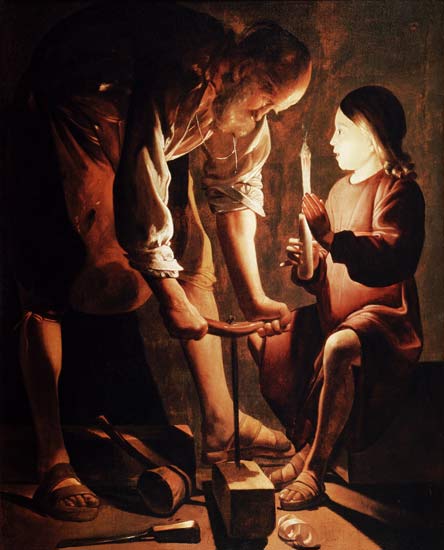 As you may know I am currently teaching a series of classes on Catholic apologetics at my parish. One class topic we explored was on the canon of Scripture, that is, on why the Catholic Bible contains seven more Old Testament books than Protestant Bibles (or, alternately phrased: why are Protestant Bibles smaller?)
As you may know I am currently teaching a series of classes on Catholic apologetics at my parish. One class topic we explored was on the canon of Scripture, that is, on why the Catholic Bible contains seven more Old Testament books than Protestant Bibles (or, alternately phrased: why are Protestant Bibles smaller?)The word “canon” comes from a Greek word (that may be derived from a Hebrew word) originally meaning “reed”— it means a standard, or rule. Christians apply the term to the list of inspired books that appear in the Bible. After being defined by the Church in her early centuries, the canon went virtually unchallenged for about 1100 years, that is, until the Reformation.
Someone who attends my class asked me "All this is great information, but when do you ever have an opportunity to use it?" I told her that the opportunities will come when you least expect it, and the knowledge is never wasted.
The following is from an amiable conversation I had earlier this week in a online discussion forum regarding the canon of Scripture. I am in blue and my interlocutor is in red:
First, you don't even know your own history concerning your Church and the Apocrypha or you chose pick out the certain parts and leave out others; they were used by some for devotional purposes and not by others within your own Church, some considered them inspired and others did not within your own Church; but when the reformation came and and challenged the issues of praying to and for the dead, the perpetual virginity and immaculate conception and other challenges were made to the Church; this is when they decided to hastily Canonize 11 of the 14 Apocrypha books. This way anyone who denied the books as inspired and the issues contained within; then the Church pronounced anathema on them.
I'm afraid it is you, my friend, who are ignorant of history. The Council of Trent merely reaffirmed, in the face of heresy, the 73 book canon that had been authoritively affirmed several times before that. To wit:
·Council of Rome, 382 AD, included all protocanonical AND deuterocanonical books (this is the first record we have, incidently, of all 27 New Testament books being affirmed as canonical. Protestants acknowledge this, but deny that same ccouncils authority to affirm the 73 OT books. Go figure.)
·73 book canon ratified by the Councils of Hippo (393 AD) and Carthage (397 AD).
·73 book canon infallibly declared at the Council of Florence (1441)
·73 book canon dogmatically defined by the Council of Trent in 1546.
Furthermore, from the Jewish perspectives the Hebrew canon was closed around 300 BC and did not include any of the extra books.
Furthermore, from the Jewish perspectives the Hebrew canon was closed around 300 BC and did not include any of the extra books.
By then the Church had long been using the Septuagint version of Scripture that included all 73 books. Besides, in what way does 4th century Judaism have the right to definitively define the Christian canon?
The earliest Septuagint did not include the Apocrypha and overtime it was added.
It is true that there were several Septuagint versions with varying canons. What is crucial is that the early Church clearly used the version of the Septuagint containing the canon that contained 46 books, as a careful reading of the New Testament and the Apostolic and other Early Church Fathers will affirm.
At this point, the other party started ignoring my posts and basically kept repeating the same information. But hopefully a seed was planted; if not in this particular person, but in others who may have been viewing the conversation. If nothing else, it was good practice for me. :)











No comments:
Post a Comment